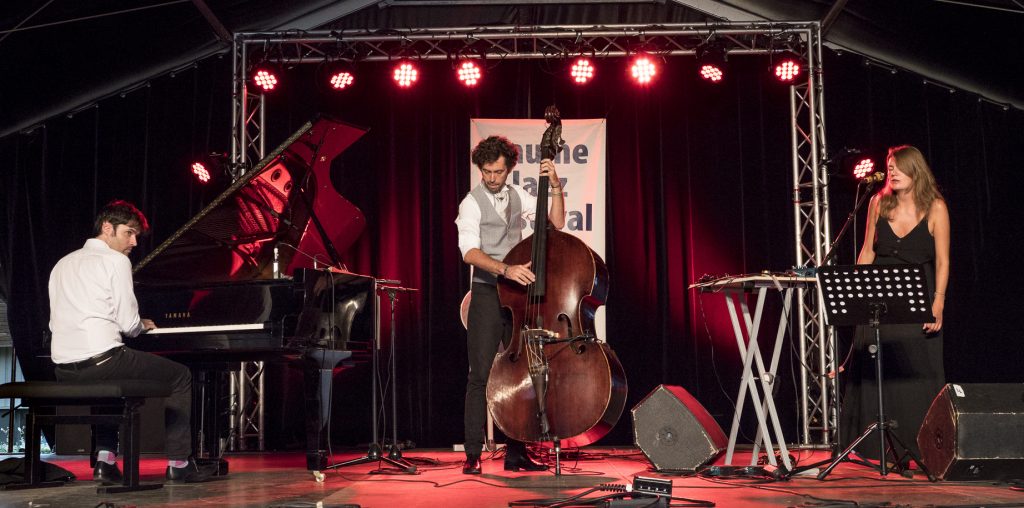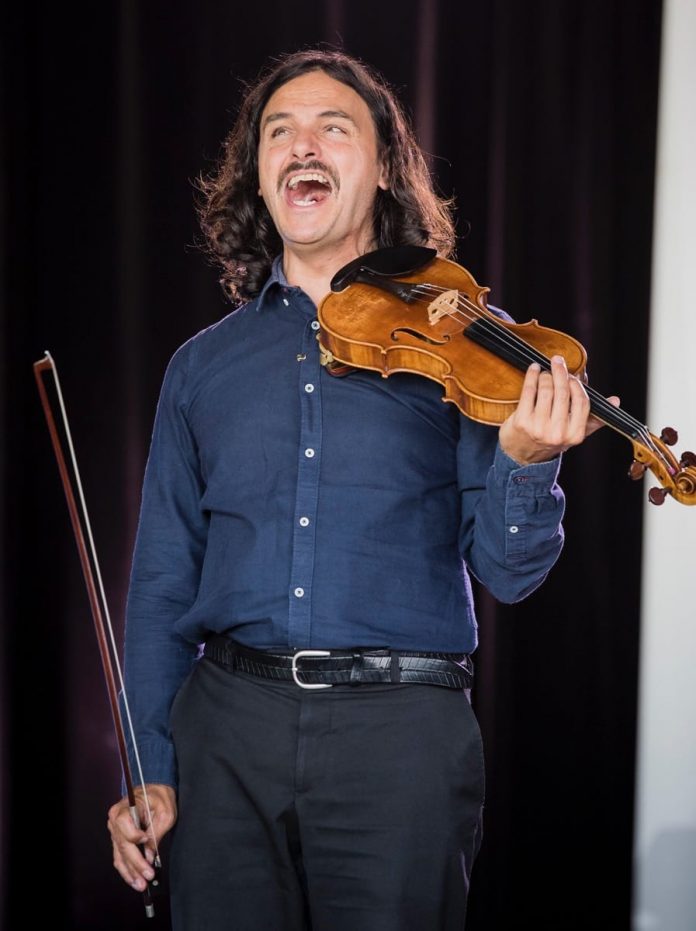Dare I say that my presence at the Gaume Jazz Festival – renamed for this 2020 edition “Y’a du Gaume Jazz dans l’air” – was particularly noteworthy to me, as I started attending this wonderful festival this time 20 years ago.
It was originally cancelled due to the Belgian government introducing harsh COVID-19 restrictions but festival director Jean-Pierre Bissot and his crew worked tirelessly to find a compromise to allow the festival to take place in another format. While other organisers took a completely new approach bearing no resemblance to the original casting, Bissot managed to maintain a good chunk of the original programme with 12 gigs that kept a faithful 200 jazz aficionados alive and kicking from 7 to 9 August.
In its 36 years of existence, one of the most well-known features of the Gaume Jazz has always been its friendly and relaxed atmosphere that entices you back year after year, and it would have been such a shame to miss it this time around.
It was hotter than July, as Stevland Morris once sang, and we were all thankful to two renowned Belgian breweries for keeping us cool under the fiercest sun ever felt in the bucolic village of Rossignol.
The festival kicked off with a Belgian contemporary version of the Quintette du Hot Club de France, only this time led by the violins of Tcha Limberger and his partners. Les Violons de Bruxelles’s lively set proved to be a perfect start as their chords sang through the crowds.
Taking the stage next was Ann Pierlé’s quartet, born from a meeting between musicians who you would think had little in common at first sight! After her 2017 meeting with keyboardist Hendrik Lasure, percussionist Casper Van de Velde and multi-instrumentalist Koen Gisen they decided to create the Ann Pierlé Quartet based on jazz adaptations of the vocalist’s repertoire. The singer also held a coaching session this week for a group of kids aged between 4 and 14, called Les p’tits Gaumais du Jazz.
Mingling various art forms on stage is no small task, and Artra Poetik, a group created by comedian and vocalist Charlotte Bourriez, rose to this challenge in the best possible way. While Yan Conteau was improvising some stage painting alongside fresh poems recited by Charlotte Bourriez, pianist Eve Beuvens and drummer Etienne Plumer provided the jazz part.
It turned out to be a poetic afternoon as this young quartet was followed by the veteran trio L’âme des poètes. It was their first gig after five months of interruption but certainly not their first appearance at Gaume Jazz, as we are reminded of their 1994 live recording available on Igloo records. The trio was formed in 1992 and almost 30 years later they are still digging for inspiration in French songbooks. While making his usual play-on-word jokes, double-bass player and comedian Jean-Louis Rassinfosse reminded the audience that French songs are not only the prerogative of French-born musicians. When George Moustaki wrote Le métèque he obviously knew the exact meaning of that ancient Greek word (metoikos: a foreign resident, historically of Athens and with no citizen rights) as well as its contemporary pejorative meaning in French. That song and many others taken from the trio’s latest album are all fine examples of compositions written by foreigners who became stars in France, such as Charles Aznavour or Dalida to name but a few.
After a blues duo interlude by Dalva, it was time to witness the first ever collaboration between two young promising pianists, Amaury Faye and Igor Géhénot. The two have been pursuing their own solo projects for some time now, but they were eager to take up the piano-duo challenge. When they kicked off with a couple of standards from the Great American Songbook, it was quite reminiscent of a recording at the Marciac Festival from Kenny Barron and Mulgrew Miller, only to later evolve into something completely different with a more contemporary repertoire. After such a brilliant performance, we can only hope that they find themselves in a recording studio sometime soon! The day came to an end with The Wrong Object, a Zappa-influenced sextet that has made its name for itself on the Belgian jazz scene since its inception in 2003.
Day 3 started at 3pm sharp with a young Franco-Belgian piano trio led by Joachim Caffonnette. Only two years after its formation, they released their first CD Vers l’azur noir. The pianist drew his inspiration from the migrant stories we would hear in the news before COVID-19 took over.
Bringing more original tunes was the next band, Harvest Group, led by guitarist Guillaume Vierset. Nacimiento-Fergusson Road in California, while not as widely known as Route 66, was still the inspiration for Guillaume Vierset’s new album. Alongside the guitarist’s Americana notes, cellist Marine Horbaczewki adds a layer of chamber music while much of the jazz component comes from the other members of the quintet, namely siblings Yannick and Yves Peeters on double bass and drums, respectively, and saxophone player Mathieu Robert.
There were a number of folk influences creeping up on the last day of the festival, most notably with Swedish vocalist Isabel Sörling, firstly as part of You and lastly as a member of the Paul Lay trio. This blend of the two genres dates back to the Swedish folk-based jazz of the 1960s and pioneer pianist Jan Johansson, and it has remained the trademark of Swedish jazz ever since. The Rouen-based trio gave their Belgian première shortly after Harvest, which didn’t take us too far from the Nacimiento Road in terms of sound. Between Isabel Sörling’s double appearance, a local band relived the cabaret era through a Gershwin and Cole Porter repertoire.

Before staging a world première in Dudelange (an hour’s drive from Rossignol) the following week with another Basque-born musician, Michel Portal, Paul Lay’s Deep Rivers – mostly comprised of originals – transported us back in time to celebrate the very first appearance of jazz in Europe right after the end of the First World War.
With fresh musical memories in my head, it was unfortunately already time to bid farewell and dream of my next jazz escape a few days later in Dudelange.


